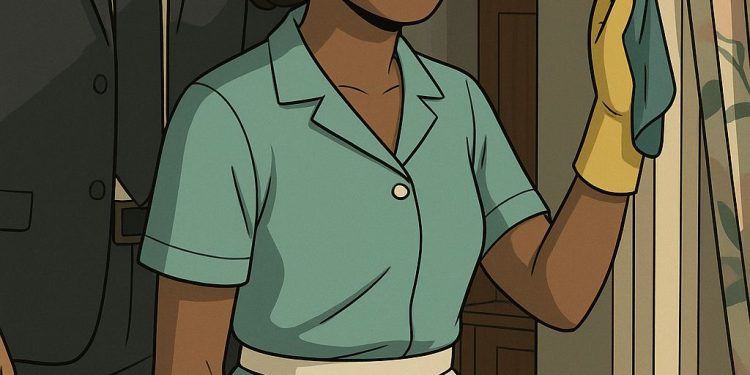“He said if she aborted, he’d kill her.”
These are the words of ’Masechaba’s mother (not her real name), whose daughter was sexually exploited.
‘Masechaba is a 31-year-old woman who was sexually exploited by her boss — a man known in town for his businesses, and feared for the power he wields behind the scenes. She already had a child when she left home in search of work. Her second child, born from that ordeal, just turned one.
What first seemed to be a decent job, turned out to be a continued nightmare, not just for her, but for many others trapped in a system of fear, corruption, and alleged trafficking.
In October 2023, ’Masechaba was desperate for work when a friend told her about a housekeeping job at Khune Village in Welkom. The opportunity came through a chain: a colleague’s cousin had mentioned the job to the colleague, who then told ’Masechaba’s friend. Although the friend had been approached first, she recommended ’Masechaba instead, as she was unemployed at the time.
With nothing but a blanket, ’Masechaba left Lesotho and caught a ride with another lady going for the same job. They were told food and transport would be provided, though it would later be deducted from their salaries. A man, arranged by the employer, picked them up in Maputsoe and handed them over at Khune Village — a move she now believes was part of a larger human trafficking operation.
Upon arrival in Khune Village—a liquor establishment connected to a ‘guesthouse’, things quickly turned dark. ‘Masechaba and the lady she arrived with were separated. She was told she’d earn M2,500 monthly, but would be borrowed anything she needed , which would later be deducted from her salary with a steep 35% interest.
The following day, the man who owned the facility — the same man who was her employer, demanded to sleep with her. When she refused, he forced himself on her. But the abuse didn’t stop there. He repeatedly pushed himself on her in the days that followed, kept coming back, asking for more. Eventually, she gave in — not out of consent, but as a way to survive and try to brush him off. “I thought maybe if I agreed, he’d stop. But it just never ended. It became a normal thing,” she said, her voice breaking.
In tears, she recalled how he later admitted he ran a prostitution business and asked if she was interested in joining. “Because I hadn’t met the others when I arrived, I never told anyone. But as days went by, another woman confided in me that he was also sleeping with her,” she said. “We kept quiet about it until we decided to escape.”
For a month, ’Masechaba worked silently, enduring trauma and confusion. Eventually, she asked the boss to let her Lesotho before the 30 days were up to stay within the then legal limit allowed by immigration.
As she planned her escape, she opened up to the lady she arrived with, only to discover that the same man had tried the same thing with her friend back in 2015. That friend had managed to flee on her second day.
Before leaving, ’Masechaba convinced another woman to escape with her. On payday, they were handed meager wages — just M1,100 after deductions. When they tried to leave, the security guard at the gate refused to open for them. “We had to jump the walls to escape,” she said.
After their escape, they made their way to Beautiful Dream Society, an organisation that assists victims of human trafficking. That’s when ’Masechaba began to unpack her trauma. Her mother, who had been in Lesotho, said she had been excited her daughter found work, only to be shocked by what unfolded. “She never stopped crying when she got home,” her mother said. “She just wanted to support her 9-year-old child, not be enslaved.”
Patterns of Exploitation
’Masechaba’s story is not isolated. Khune Village keeps coming up. Weekly Observer investigating the place, found it referred to where “the real things happen” in as far as sex trafficking is concerned.
Investigations reveal a darker history. On 15 January 2018, Daily Dispatch published an exposé titled “Inside Free State Farm Suspected Human Trafficking Lair”. The article revealed that 10 people — from Lesotho and South Africa — were rescued from a farm just outside of Welkom. Six suspects were arrested.
The article described a chilling scene: a farm with a sign reading “Livestock for sale”, but inside, boxes of condoms, a receipt book, and detailed records of transactions:
- 22/12/17. Alice. 1 hour. 6:5 out 7:5. Room 6. R120.
- 25/12/17. 2 hours. 5:15 out 7:15. Room 9. R240.
- 01/01/18. 1 hour. 6:30 out 7:30. Room 13. R250.
The publication reveals that Authorities at the time stated the farm as : “one of the province’s most infamous human trafficking syndicates. Its purpose: the alleged trade of young women from across southern Africa.”
A cleaner interviewed in the article confirmed this, saying: “There are all kinds of girls. Basotho, South Africans. They are guarded. You can buy a girl like you buy alcohol.” He recounted seeing three girls from Lesotho the previous year — one still in school uniform — claiming they had come “to clear weeds.”
He ended with a stark warning: “Go to town and you will find out more information. Everyone knows.”
“Go to town and you will find out more information. Everyone knows.”
‘Masechaba had indicated that the owner runs multiple establishments, guest houses, farms, car wash, placing his workers at whichever outlet he chooses. “During the day, it’s work. In the evening, it’s sex”.
Sources based in Welkom confirmed that Khune Village is notorious for prostitution, and has been operating for many years. The resident said, “Everyone knows what’s happening there. The owner is very much feared.”
The same source added that Welkom has a reputation for “brown envelopes” — a term commonly used to refer to bribes and backdoor dealings. This indicates possibilities of how the place continues to operate the way it does.
In April this year, a social media post made ‘anonymously’ warned about the place. The post exposed an image of a woman allegedly recruiting on the owner’s behalf sparked a wave of responses from the victims, survivors, and those who know about the place. Some spoke of similar experiences. Others shared warnings. A WhatsApp group has even been created by those who once worked at the guest houses — a silent network of survivors seeking healing and justice.
But while stories surface, fear still reigns. Many remain quiet, too scared to step forward. Others might simply be unaware that what they’ve endured constitutes trafficking — a crime hidden under the guise of employment.
Speaking to the Free State Provincial Spokesperson of the South African Police Service (SAPS) yesterday, it was confirmed that Khune Village is a licensed liquor establishment in Welkom.
It remains unclear whether the ‘guesthouses’ mentioned by sources are legally operating.
Brigadier Motantsi Makhele stated that over the past two years, two rape cases linked to the area were investigated by the HAWKS.
“According to our records, those cases were finalised in court,” he said.
He further noted that due to high police visibility and regular patrols, there have been no recent reports or ongoing investigations related to the liquor establishment at Welkom SAPS.
However, Weekly Observer was unable to confirm whether any action has been taken against the owner of the establishment, as implicated in past HAWKS investigations.
As more voices like ’Masechaba’s come forward, so does the urgent need for accountability and protection. Civil society, law enforcement, and regional organisations must take decisive action.
Places like Khune Village and the farm are not just names on a map — they are alleged scenes of silent suffering. Unless exposed and confronted, more lives risk being destroyed behind closed guesthouse doors.
It is equally vital that survivors and witnesses are encouraged to report cases of abuse. Speaking up is the first step to breaking the cycle.
refer to: [Referral](https://www.dailydispatch.co.za/news/2018-01-15-inside-the-free-state-farm-suspected-to-be-a-human-trafficking-lair/)




